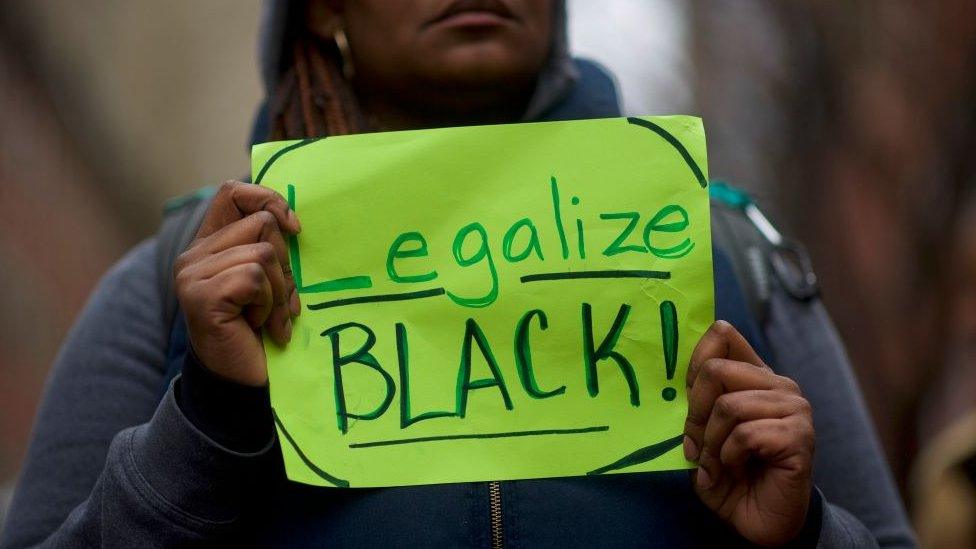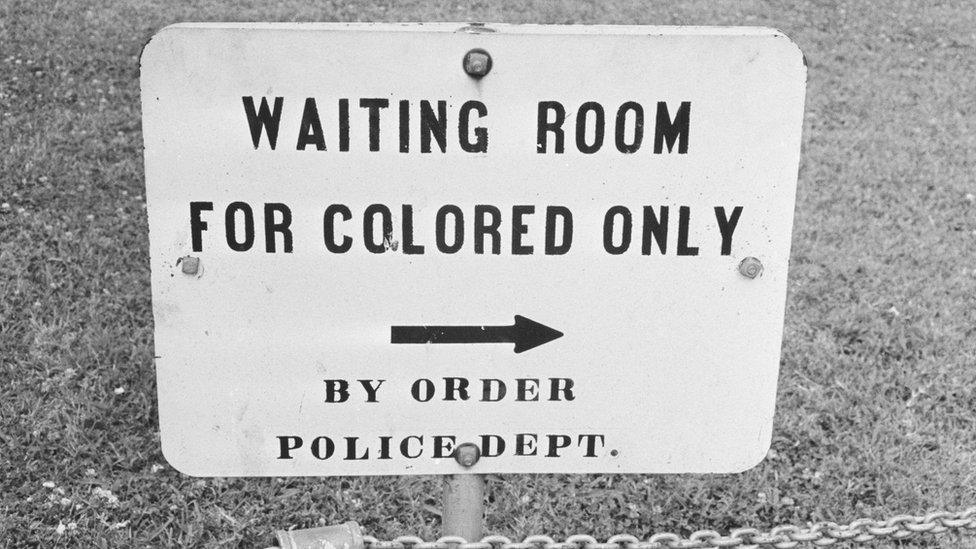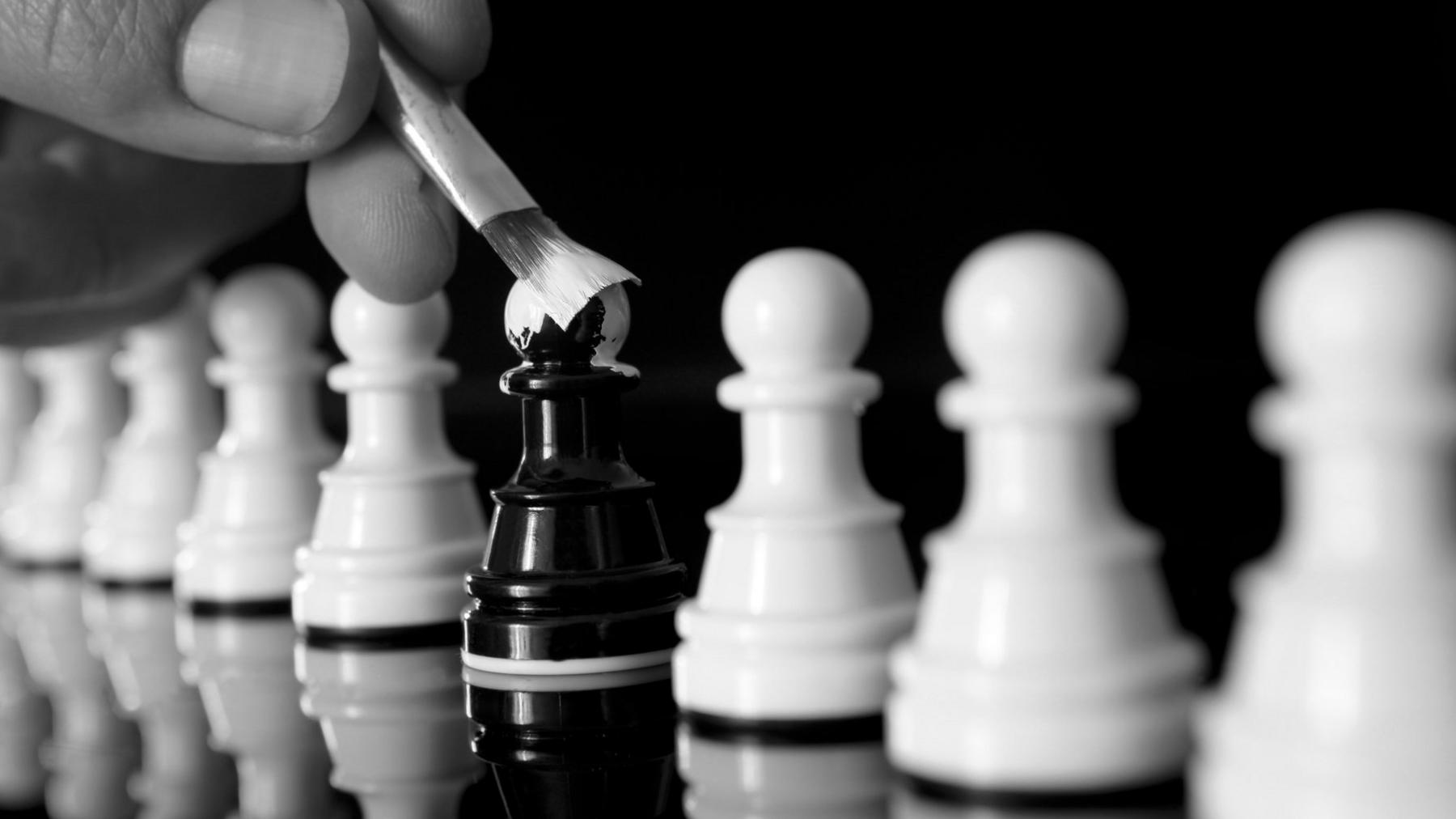Viewpoint: Why racism in US is worse than in Europe
- Published
Viewpoint: Racial aggressions are part of America
News stories emerge almost daily in the US about police being called over black Americans doing nothing more than being black. Writer Barrett Holmes Pitner explains why he thinks American racism is unique.
Last week in California, three black people - a Jamaican, a Canadian of Nigerian descent, and a London native - were confronted by seven police cars as they checked out of their Airbnb, external because a white American thought they were robbing the house.
Though they were not American, they were still subjected to racist American stereotypes - and being confronted with tense, potentially life-threatening altercations with police without ever committing a crime.
I've travelled a fair amount around the world, but America's racist status quo remains unique and alarmingly oppressive. American racism is entirely complexion-based and monolithic. One's nationality is immaterial.
Years ago during one of my trips to France, a woman at La Poste refused to sell me stamps because she thought I was African.
When she learned that I was American, she apologised and sold me the stamps. The racism I experienced in France is totally unacceptable, but it provided an escape not afforded last week to these three visitors to America.
In France, nationality usurped race, and while that can have its own problems, it was still very different from the racism back home.
When I was in London, I lived in Bethnal Green during the 2011 riots, which started after London police officers killed Mark Duggan, a black man.
As teenage vandals looted and set my neighbourhood ablaze, I remember casually walking down the street during the chaos and having a London police officer politely ask me to return to my flat. There was no tense exchange, I was not arrested, and I never feared for my life.
During the week of the riots, Londoners openly discussed how black people might receive different treatment from law enforcement, but conversations focused on analysing policing techniques, discussing ways to keep teenagers off of the streets during the summer when they do not have school, and catching looters via CCTV.
In the American discourse, a supposedly inherent danger or criminality of black bodies would have been used to justify the police's killing of Duggan and present the riots as an inevitable by-product of a "culture of crime". The killing of Michael Brown and the riots in Ferguson followed this all-too-familiar American script.

A protest holds a sign outside of the Starbucks where two men were arrested
Racism towards black people in America has largely nothing to do with immigration or nationality. There is no home country for African-Americans to connect to. Instead it is essentially a status quo of domestic alienation, dehumanisation, criminalisation, and terror. European racism is bad, but it was still more welcoming than America's.
America's systemic racism starts with slavery and the various slave codes - state or federal laws created that codified the inhumane practice of chattel slavery into law. The American South was a "slave society", not merely a society with slaves. However, following the abolition of slavery, laws similar to the slave codes continued to oppress black people.
Following the Civil War, these "black codes" had the explicit purpose of depriving newly freed black Americans of the rights they had won. Black codes varied from state to state, but their legal foundation centred on vagrancy laws that allowed for an African American to be arrested if he was unemployed or homeless. They applied to countless blacks because housing and employment opportunities for freed blacks in the South were almost non-existent after the war.
Supporters of Virginia's Vagrancy Act of 1866, one of these measures, stated that it would reinstitute "slavery in all but its name".
White Southerners would report blacks for vagrancy, and law enforcement would arrest them and sentence African-Americans to up three months of forced labour on public or private lands.

Segregation and Jim Crow laws were among many historical measure that criminalised black existence in certain spaces
The federal government fought against black codes during Reconstruction by electing former abolitionists and freed blacks to public office, and creating laws and adding amendments to the US Constitution to protect the rights of black Americans.
But following the collapse of Reconstruction in 1877, Southern states brought them back. Black codes became the bedrock of state constitutions. Poll taxes and literacy exams to prevent African Americans from voting soon became the norm. Jim Crow and racial segregation, which governed the South until the 1960s, are outgrowths of those laws.
As black families fled the South in the 20th Century during the Great Migration, black codes followed them to Los Angeles, Chicago, New York and elsewhere. Black Americans - who were domestic refugees fleeing state-funded terrorism - allegedly brought crime, unemployment, vagrancy, and drugs. Police departments across America responded with more black codes and aggressive policing of black communities.
Black life has always been criminalised and dehumanised in America. During Barack Obama's presidency, Michael Brown, Eric Garner and countless other unarmed African-Americans were killed by police, but with a black president many Americans felt progress was attainable. Social media raised awareness of these injustices and helped create the Black Lives Matter movement.
Under President Donald Trump, we have the same type of violence that America has always had, but now we have, at best, an indifferent federal government, and at worst a racist president. Due to this change, more white Americans are emboldened to re-employ black codes.
Under Obama, social media championed our desire for progress, and today it documents our obvious regression.
Inside the mind of White America
Last week in New York City, a black lawyer and her 19-year-old daughter were handcuffed and detained, external by police after being falsely accused of shoplifting. During the same week, the police were called by a white student at Yale University because a black Yale student was sleeping in the common area in their dormitory. In late April, an African-American family had the police called on them, external by a white woman for having a cookout in a public park.
Following the arrest of two black men for sitting in a Starbucks, and the increased awareness of similar injustices, the world can more clearly see the racist applications of the law that black people constantly face in America. Their arrest was black codes in 2018, but without the three months of forced labour.
Trump's presidency has exacerbated the problem and social media has raised awareness, but employing black codes and masquerading oppression against black people as democratic justice and fair law enforcement has sadly always been America's status quo.
Barrett Holmes Pitner is a writer and journalist based in Washington, DC.
Correction: An earlier version of this report incorrectly stated that Trayvon Martin was killed by police.
- Published16 June 2016
